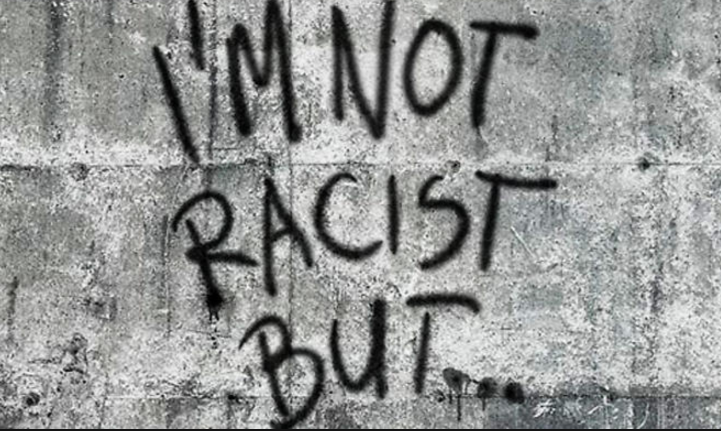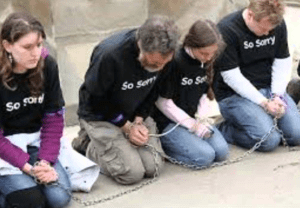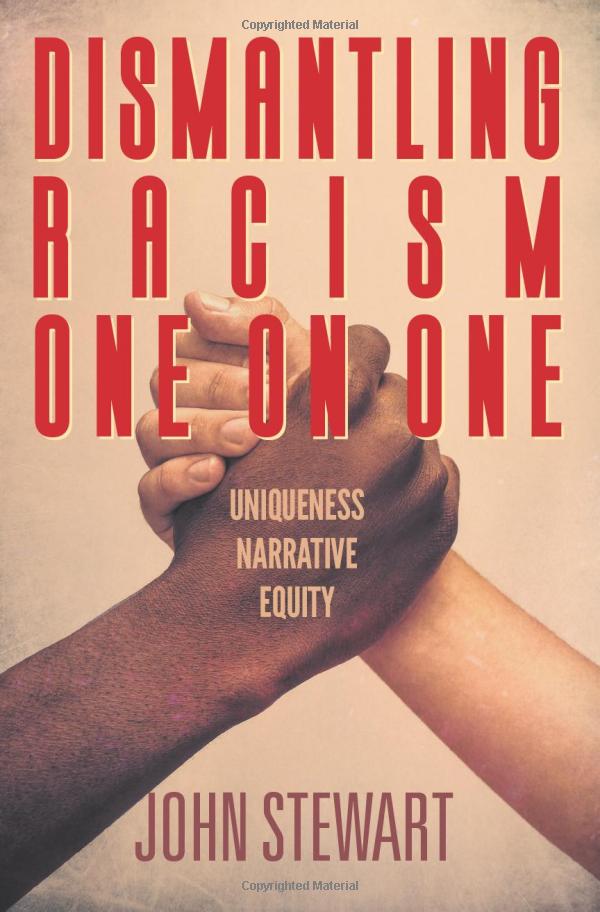
- Forty percent of unarmed people shot and killed by police officers are Black, even though Black men make up 6% of the nation’s population. http://www.denverpost.com/2016/07/12/fact-check-more-whites-shot-by-police-in-2015-than-minorities/
- When statistics on employment, educational attainment, home ownership, and income are disaggregated by race, Blacks are consistently at the bottom; they are at the top of incarceration counts. https://www.brookings.edu/blog/social-mobility-memos/2015/01/15/five-bleak-facts-on-black-opportunity/; https://www.prisonpolicy.org/reports/pie2017.html gclid=CjwKEAjw_bHHBRD4qbKukMiVgU0SJADr08ZZtIFKwe0xVicQWfXhom6oaFFnJ_PtdUmw9x5zZ3dGwxoCgj3w_wcB
- There continue to be serious problems with Black/White racism in the U.S.
As Tim Wise has pointed out, White America has a serious problem ending sentences like these with a period. We believe in the commma. We believe in the semicolon or the em-dash. We believe in the “. . . BUT. . . .”
- “But, police officers still shoot and kill more unarmed White men.”
- “But Black home ownership is increasing.”
- “But racism isn’t as bad as it used to be. Obama was President for two terms. Oprah is a billionaire.”
At a recent community conversation I attended, seven people listened to a teacher who works extensively with African American junior high and high school students describe how these young people in our predominantly white community experience racism every single day. A midde-aged man from one of the mainly White parts of town exclaimed, “That CAN’T be true!!”
Denial is widely-recognized as the almost-universal first phase of drug and alcohol addiction. Racism, too. In mid-2017, most of White America is in denial about how seriously racism continues to poison our country.
Today, Countrywide Finance, Wells Fargo Bank, and other financial institutions continue to pay hundreds of millions in fines for charging Blacks and Hispanics higher interest rates and fees than equally qualified White customers. https://www.theatlantic.com/business/archive/2011/12/countrywides-racist-lending-practices-were-fueled-by-greed/250424/
On April 7, 2017, a Federal judge, over the objections of the Trump administration, approved the overhaul of the Baltimore police department to address its longstanding racist practices, https://www.wsj.com/articles/federal-judge-approves-baltimore-police-overhaul-1491580929
Feature films like “13th” and “I am Not Your Negro” document widespread and systemic racist practices across all segments of contemporary U.S. culture.
Explicit racial bias may happen less frequently than during Jim Crow or even in the 1950’s, but implicit racial bias continues to infect U.S. hiring and lending practices, teaching and school administration, media coverage, church attendance, college admissions, law enforcement, and the everyday comments and practices of the vast majority of White America.
- As a result, even highly-educated, middle-aged Black professionals admit to their friends that, as one confided to me, every morning as they leave home for work, they “put on their mask” to cope with White America.
- They expect to be followed in stores.
- They’ll watch the Human Resources office where they work extend the background check process for applicants of color.
- Yet another clerk will have trouble spelling Shaquilla, Nia, DeAndre, Shanice, Malik, or Brishauwna.
- They know they’ll be asked at least once today to explain “How you people feel.”
- And if not today, at least tomorrow, someone white will want to insist that All Lives Matter.

White Shaming or Response-Ability?
So are those of us in power supposed to feel guilty for all this? To be ashamed? After all, we don’t condone slavery. We support equality, for women and people of color. Although, we have to admit, none of our best friends are Black, some of our good acquaintances are. Why treat us as part of the problem?
Although a dollop of shame might, as a Catholic nun recently assured me, provide motivation to change, the point is not to accuse or create guilt. The worst problems are systemic, historically entrenched and bigger than any one of us. We are subject-to the features of the systems we populate, whether we want to be or not.
The solution is to practice response-ability, the willingness and ability to respond. None of us is guilty for the way things are in lending, education, employment, or law enforcement. And each of us needs to educate ourselves and to take steps to respond to the injustices around us. To resist racist jokes. Combat implicit bias. Ally with persons of color.
The first step is to clean up our grammar. Racism is alive in the U.S. today. Implicit bias, especially against Blacks, is a serious problem in our country. Period. End of sentence. No commas. No “Buts.” No qualifiers.
Pockets of progress leave systems mostly unchanged.
Each of us has room in even our busy schedules to reduce the effects of implicit bias. To say something when you see or hear something. To walk toward, rather than away from a Black man. To practice cultural humility. To act positively in our own sphere of influence.
It works when you do.


